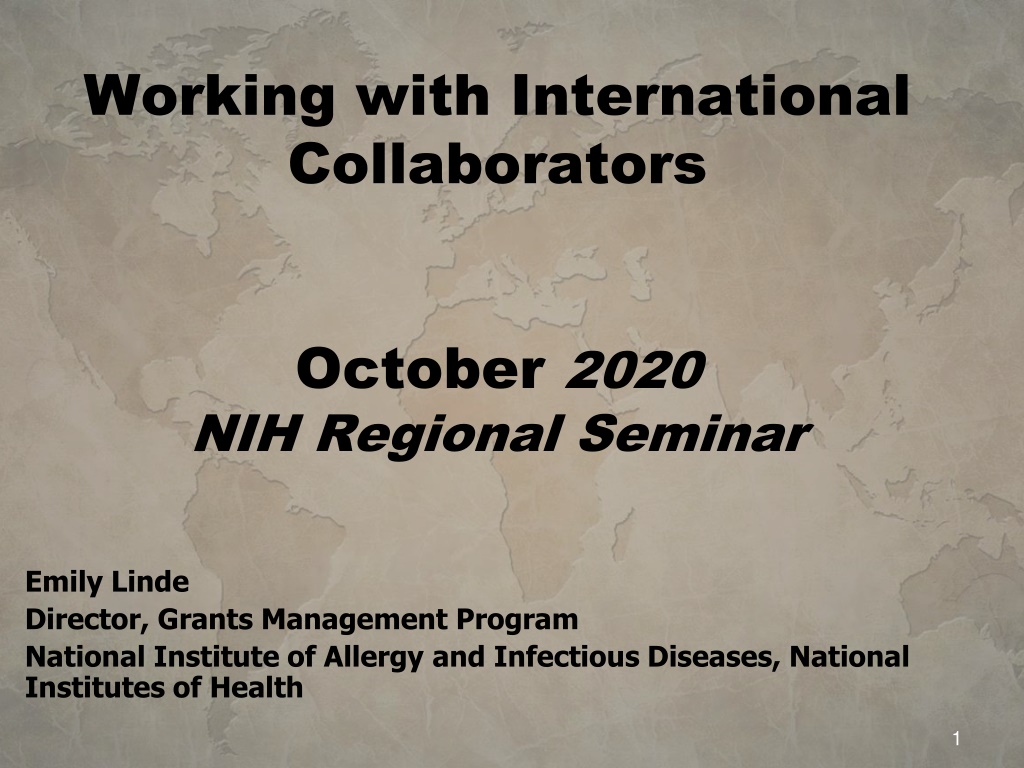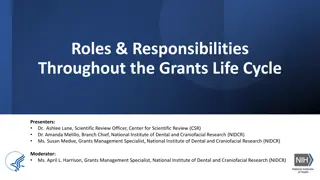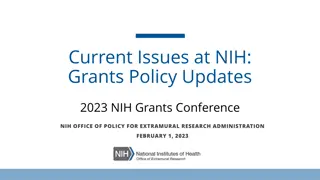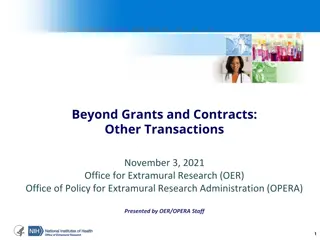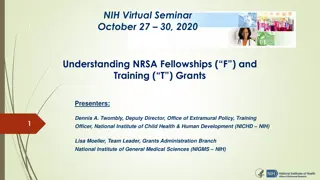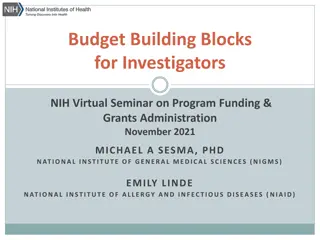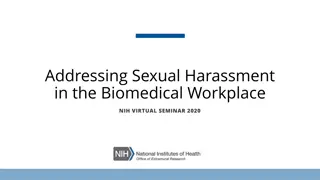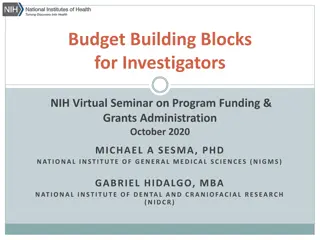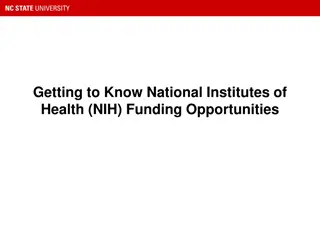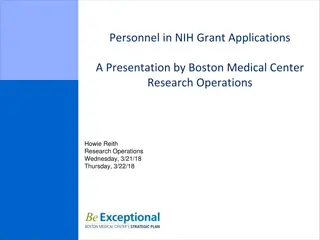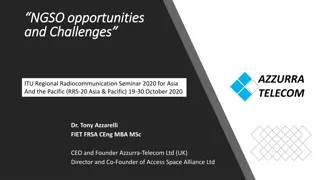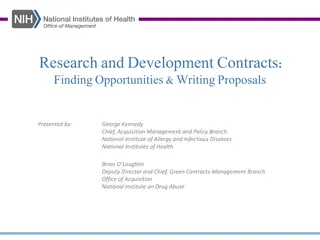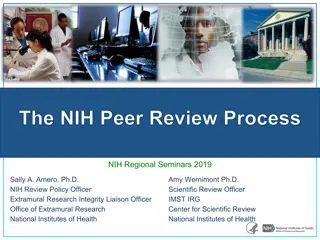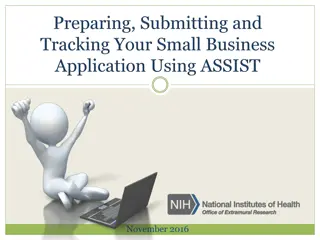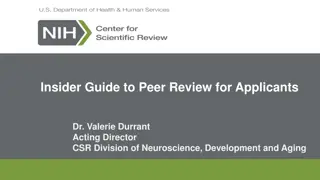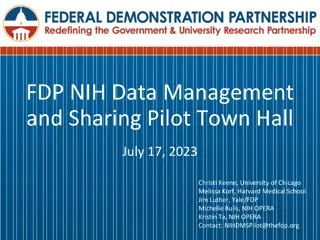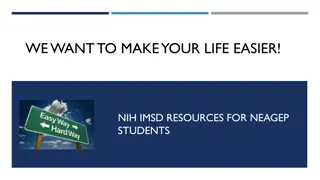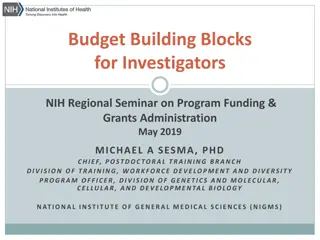Working with International Collaborators: NIH Regional Seminar Overview
Explore key considerations when collaborating with foreign institutions for research projects funded by the National Institutes of Health (NIH). Learn about the significance of international research, NIH's investment strategies, the definition of a foreign component, and application eligibility criteria for foreign institutions. Gain insights into the benefits and challenges of working on projects with international partners.
Download Presentation

Please find below an Image/Link to download the presentation.
The content on the website is provided AS IS for your information and personal use only. It may not be sold, licensed, or shared on other websites without obtaining consent from the author. Download presentation by click this link. If you encounter any issues during the download, it is possible that the publisher has removed the file from their server.
E N D
Presentation Transcript
Working with International Collaborators October 2020 NIH Regional Seminar Emily Linde Director, Grants Management Program National Institute of Allergy and Infectious Diseases, National Institutes of Health 1
Overarching Considerations Foreign Institutions function differently Language Time Zones Internet Access Sponsored programs staff NIH funding requirements Plan for delays, differences and dialogue 2
NIH and International Research Reasons why NIH supports international research: Application presents special opportunities for furthering research programs through the use of unusual talents, resources, populations, or environmental conditions not available in the U.S. or that augment existing U.S. resources. Specific relevance to the mission and objectives of the awarding IC and has the potential for significantly advancing the health sciences in the U.S. 3
NIH and International Research How NIH invests globally: Direct foreign grants Domestic grants with foreign components Domestic Awards with Foreign Component 6345 6958 7,512 8,348 Direct Foreign Awards 498 544 548 586 Fiscal Year 2017 2018 2019 2020 4
Definition of Foreign Component Performance of any significant scientific element or segment of a project outside of the United States, either by the grantee or by a researcher employed by a foreign organization, whether or not grant funds are expended. Activities that would meet this definition include, but are not limited to: Involvement of human subjects or animals Extensive foreign travel by grantee project staff for of data collection, surveying, sampling, and similar activities Any activity of grantee that may impact U.S. foreign policy through involvement in affairs or environment of a foreign country Examples of other grant-related activities that may be foreign components: Collaborations with investigators at foreign site anticipated to result in co- authorship Use of facilities or instrumentation at a foreign site Receipt of financial support or resources from a foreign entity Foreign travel for consultation is not considered a foreign component. 5
Application: Eligibility Review Funding Opportunity Announcement (FOA) for Eligibility Foreign Institutions may or may not be eligible Foreign components may not be allowed Foreign components may or may not be required Foreign applicants required to submit detailed budgets Contact NIH program staff 6
Application: Eligibility Review Funding Opportunity Announcement (FOA) for Eligibility Foreign Institutions Non-domestic (non-U.S.) Entities (Foreign Institutions) are not eligible to apply. Non-domestic (non-U.S.) components of U.S. Organizations are not eligible to apply. Foreign components, as defined in the NIH Grants Policy Statement, are allowed. 7
Application: Eligibility Foreign organizations are generally not eligible to apply for these types of grants: Kirschstein-NRSA institutional research training Program project Center Resource SBIR/STTR Construction grants Note, some activity codes, such as program project grants (P01), may support projects awarded to a domestic institution with a foreign component. 8
Application: Eligibility Develop your research idea Should be important (have high impact) Needs to align with an IC mission Talk with NIH Program staff about your idea and where it fits Identify a funding opportunity announcement (FOA) If no FOA specific to your area, look to a parent announcement Write a strong proposal that addresses review criteria 9
Application: Agency Contacts FOA EXAMPLE: Section VII. Agency Contacts We encourage inquiries concerning this funding opportunity and welcome the opportunity to answer questions from potential applicants. Scientific/Research Contact(s) Paula S. Strickland, Ph.D., MPH National Institute of Allergy and Infectious Diseases (NIAID) Telephone: 240-669-2922 Email: pstricklan@mail.nih.gov Peer Review Contact(s) Louis A. Rosenthal, Ph.D. National Institute of Allergy and Infectious Diseases (NIAID) Telephone: 240-669-5070 Email: rosenthalla@niaid.nih.gov Financial/Grants Management Contact(s) Tseday Girma, MPA National Institute of Allergy and Infectious Diseases (NIAID) Telephone: 240-747-7388 Email: Tseday.girma@nih.gov 10
Tips for Investigators Collaboration May be required by announcement Is considered by review group Investigators Make use of tools in RePORTER for finding investigators Foreign investigators US Investigators Connect with centers or institutes in global health 11
Tips for Foreign Investigators Eligible does not equal competitive Talk with NIH Program staff about your idea and where it fits Things review group may consider Publication record Previous funding (best if from NIH) Justification of foreign site 12
Application: Review Criteria Each FOA specifies all review criteria and considerations that will be used in the evaluation of applications submitted for that FOA. 13
Foreign Institution Registration Grants.gov and NIH eRA Commons Must register prior to application submission Data Universal Number System (DUNS) Changing December 2020 (NOT-OD-19-098 look for further guidance System for Award Management (SAM) renewed annually NATO Commercial and Government Entity (NCAGE) https://grants.nih.gov/grants/foreign/index.htm If funded, must register with HHS Payment Management System This registration must match SAM or cannot draw funds 14
Foreign Institution Registration EIN For applications, if your organization is not in the United States, enter 44-4444444. DUNS This field is required for the primary performance site. Enter the DUNS or DUNS+4 number associated with the organization where the project will be performed. 15
Do I Contact NIH Before Applying? Mandatory: Application with budget >$500,000 direct costs (excluding consortium F&A) for any budget period. Does not apply to applications submitted in response to RFAs or other announcements that include specific budgetary limits. Optional: When RFA s request a Letter of Intent Recommended when submitting any application 16
Budget Considerations Foreign site salary norms Procurement and availability of research supplies Importation of drugs Currency exchange rates Travel, transport, visas, VAT Face-to-face team meetings 17
F&A for Foreign Awards Necessary costs incurred by a recipient for a common purpose benefitting more than one cost objective, and not readily assignable to specifically award. Supports cost of compliance with federal requirements E.g., protection of human subjects, animal welfare, invention reporting, other post-award reporting requirements, financial conflict of interest and research misconduct. 18
F&A for Foreign Awards 8 % of modified total direct costs (MTDC), exclusive of tuition and related fees, direct expenditures for equipment, and subawards in excess of $25,000. 19
Calculating F&A for Foreign Award Total Direct Cost to Foreign Prime: $290,000 Including Equipment Cost: $9,000 Including 1 Subaward: $30,000 total cost $30,000 (Subaward Total Costs) - $25,000 (Subaward Allowance) = $5,000 (In Excess of Subaward MTDC Calculation: $290,000 (Total Direct Costs) - $9,000 (Equipment) - $5,000* (In Excess of Subaward Allowance) = $276,000 F&A Calculation: $276,000 x 8% = $22,080 Total Cost calculation: $290,000 TDC + 22,080 (F&A) = $312,080 20
Calculating F&A for Foreign Award Direct Cost at Foreign Prime: $260,000 Including Equipment Cost: $9,000 subaward total costs $30,000 total cost 290,000 MTDC Calculation: $260,000 (Total Direct Costs) - $9,000 (Equipment) +$25,000* (In Excess of Subaward Allowance) = $276,000 F&A Calculation: $276,000 x 8% = $22,080 Total Cost calculation: $290,000 TDC + 22,080 (F&A) = $312,080 21
Funding Collaborations Traditional Subcontract/Consortium U.S. Institution is responsible Requires a formalized written agreement Substantial scientific involvement Ensure the collaborating organization(s) understand the rules and regulations Determine who has the authority to sign for the organization Local hierarchy in foreign organization 22
Funding Collaborations Traditional Subcontract/Consortium Decide how and when the funds will be disbursed Understand local reimbursement systems Salary support for local investigators Project delays = no salary support for staff Check or Wire payments Advance payments Establish procedures for reporting progress and use of funds U.S. awardees will flow down to foreign subrecipients applicable parts of the Uniform Guidance and monitor foreign entity progress 23
Funding Collaborations Vendor Agreement Routine goods and services Ancillary to the research Provides similar service to many Not the same written requirements as consortium agreement Determine payment process 24
Human Subject Research Recipient is accountable Federal wide Assurance (FWA) and Institutional Review Board (IRB) rules apply to international domestic sites of multi-site studies that will conduct same protocol involving non-exempt human subjects research must use a single Institutional Review Board (sIRB) Some countries have in-country requirements National ethical reviews may be required 25
Human Subject Research Revised Common Rule (45 CFR 46) January 21, 2019, studies initiated on or after that date, ongoing studies that voluntarily transitioned to the Revised Common Rule, and studies that voluntarily implemented the three burden-reducing provisions during the delay period (7/19/18 1/20/19), are expected to comply with all Revised Common Rule requirements for the remainder of the study. New Exemption Codes X for applications submitted on or after 1/25/19 Changes to IRB review criteria, IRBs are now required to review and approve the research protocol. Resources: Protection of Human Subjects NOT-OD-19-050 Application Guide 26
Human Subject Research NIH discontinued support of the Protecting Human Subjects Research Participants (PHRP) training. September 26, 2018 was the last available date for the training online Per policy, NIH does not endorse any specific program to fulfill requirements. Responsibility of fulfilling PHRP Requirements lies with the institution. It is up to the institution to determine what constitutes as appropriate training. FAQ section is being created for the OEP website. References: NOT OD-00-039, NOT OD-18-221, PHRP website 27
Vertebrate Animal Research Recipient is accountable Animal Welfare Assurance (AWA) required Foreign site must provide domestic recipient with verification of IACUC approval Foreign recipients provide OLAW with an Animal Welfare Assurance IACUC approval is not required for direct foreign awards 28
Project Monitoring Research Performance Progress Report (RPPR) Section E.4--What dollar amount of the award s budget is being spent in foreign country(ies)? Domestic awardees provide dollar amount obligated to first-tier subawards to foreign entities Foreign awardees provide dollar amount of award excluding first-tier subawards to U.S. entities Dollars should reflect Total Costs For multiple foreign countries, include distribution between foreign countries Foreign travel and purchases not necessary unless part of first-tier sub 29
Project Monitoring Research Performance Progress Report (RPPR) Section G.9 Foreign Component Provide information on foreign components Significant scientific activity performed outside of the U.S. whether or not grant funds were expended NIAID adds a Term of Award to NoA to remind Grantees that research conducted outside the Unites States needs to be reported D.1 Participants Check yes and add the organization/country if the individual s primary affiliation is foreign and working in a foreign country 30
Tips for Foreign Investigators NIH Grants Policy Statement (GPS) section 7.9.1 provides a subset of common, allowable costs. The list is not all inclusive. NIH GPS Section 16.6 provides unallowable costs and grant requirements for foreign grantees and foreign components. Unallowable Costs Major alterations and renovations (A&R). Costs for major A&R (>$500,000). Patient Care Costs are provided only in exceptional circumstances. Grantees are reminded that they may not invest grant funds to defray the cost of inflation. 31
Tips for Foreign Investigators Don t forget about the Audit Requirements required if expended $750,000 or more in HHS awards. 32
Select Agent Requirements Awardees who conduct research involving select agents must provide information satisfactory to the NIH that a process equivalent to that described in 42 CFR 73 for US institutions is in place and will be administered on behalf of all select agent work sponsored by NIH funds before using these funds for any work directly involving select agents. 33
Select Agent Requirements Recipient must address key elements to NIH prior to use of funds. Safety Security Training Procedures for ensuring only approved/appropriate individuals have access to the select agent Any applicable local laws equivalent to 42 CFR 73 34
Prior Approval Change in Scope Change of PD/PI Carryover of unobligated balances required if NoA includes a term and condition of award Change or addition of a performance site within a foreign country 35
Prior Approval Transfer of a grant from foreign organization to domestic organization Transfer of a grant to or between foreign or international organizations Requires approval of the NIH and National Advisory Council or Board. Contact NIH Program Officer/Grants Management Specialist for prior approvals 36
Project Monitoring Monitoring Budget Time and effort reporting insufficient Applying 8% F&A Must maintain grant funds in an interest- bearing account; however, interest earned in excess of $500 per year in the aggregate on advances of Federal funds must be returned. 37
Dont Forget Closeout Documents are due within 120 calendar days of the end of grant support: Final Federal Financial Report (FFR) SF-425 Expenditure Data (submitted through eRA Commons); Grantees must ensure there are no discrepancies between final FFR expenditure data and Payment Management System. Reconcile award and expenditures Review carefully for restricted funds or carryovers Final Invention Statement & Certification; Final RPPR (F-RPPR) and Interim-RPPR 38
Key Take-Aways Review the Notice of Award (NoA) for funding information and to determine: Streamlined Noncompeting Award Process (SNAP) vs. non- SNAP Automatic carryover authority Federal Financial Report (FFR) For non-SNAP awards - required annually For SNAP awards - required at end of the competitive segment 39
Key Take-Aways Consult NIH Grants Policy Statement for policies and compliance requirements Have SOPs Follow four cost principles: 1. Reasonableness The dollar amount is within the limitations that a prudent person would pay for the good or service. 2. Allocability The goods or services that can be assigned directly to the grant. 3. Consistency Routinely applied to the same category. 4. Conformance Test of allowability. Grants costs must conform to the Allowability of costs/Activities section of the NIH Grants Policy Statement. 40
Key Take-Aways Communication Most foreign institutions need assistance in understanding NIH requirements Understand their unique policies, regulations and practices Be involved for the long term Be patient 41
Information for Foreign Grants https://grants.nih.gov/grants/foreign/index.htm 42
THANK YOU! Emily Linde lindee@mail.nih.gov 43
